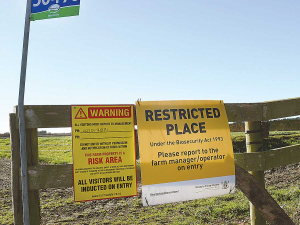Editorial: Happy days
OPINION: The year has started positively for New Zealand dairy farmers and things are likely to get better.
 MPI says imported semen is one of the possible pathways for the bacterial disease M bovis' entry into New Zealand.
MPI says imported semen is one of the possible pathways for the bacterial disease M bovis' entry into New Zealand.
The Ministry for Primary Industries says imported semen remains one of the possible pathways for the bacterial disease Mycoplasma bovis' entry into New Zealand.
Simon Andrew, director M. bovis Programme, says they are still investigating likely transmission routes.
"We've not identified any live M. bovis in testing of imported semen to date, but it is one of the possible pathways," he told Rural News.
At a recent primary production select committee hearing MPI director-general Ray Smith noted that the new incursion on a mid-Canterbury farm earlier this year was worrying. He said it was picked up through bulk tank milk testing.
"It most likely would have come through semen," Smith told the committee.
This prompted ACT's Primary Industries Spokesperson Mark Cameron to claim, "After much speculation, this is the first time that the MPI has openly admitted that imported semen is the likely culprit for the most recent incursion of M. bovis".
Cameron told Rural News that if imported semen was such a risk, the question is why it took until July 2022 for proper Import health standards to be in place.
"The initial outbreak occurred back in 2017 and had a huge impact on the industry. It caused enormous stress and anxiety for farming families and the financial and emotional toll on farmers cannot be underestimated.
"If there was a risk of imported semen bringing another strain to New Zealand then standards needed to be in place much sooner," he says.
"Farmers can't afford another outbreak.
"ACT hopes that the current cases in mid-Canterbury are contained as MPI have said they are and that all the stops are being pulled out to ensure there isn't another incursion.
Simon Andrew told Rural News that the import health standard for bovine germplasm was strengthened to further reduce the likelihood of viable M. bovis in imported bovine germplasm.
The current import health standard for bovine germplasm came into force on August 25 last year with a transition period to 25 April this year.
"New Zealand's standards for the import of bovine germplasm are among the strongest in the world," Andrew says.
The Meat Industry Association (MIA) is once again looking for game-changing ideas for New Zealand's red meat processing and exporting sector.
Environment Southland is inviting feedback on two bylaws that play a critical role in safeguarding the region's waterways and ensuring the safety of the local community.
While the North Island is inundated with rain, Southland is facing receding water levels as warm weather and lack of rainfall continues.
Entries have opened for the 2026 Fieldays Innovation Awards.
Organisers are expecting another full field of 40 of the country’s top shearers for the popular Speed Shearing event at this year’s Southern Field Days at Waimumu.
The Southern Field Days Innovation Awards have a great record in picking winners and the winner of the 2024 event will be putting up a display to support the event at this year’s show.